#CHRISTIAN ZIONISM
Explore tagged Tumblr posts
Text

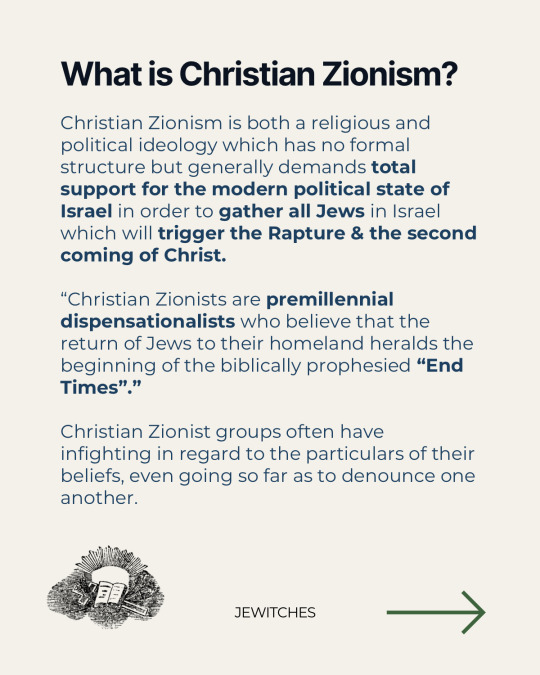
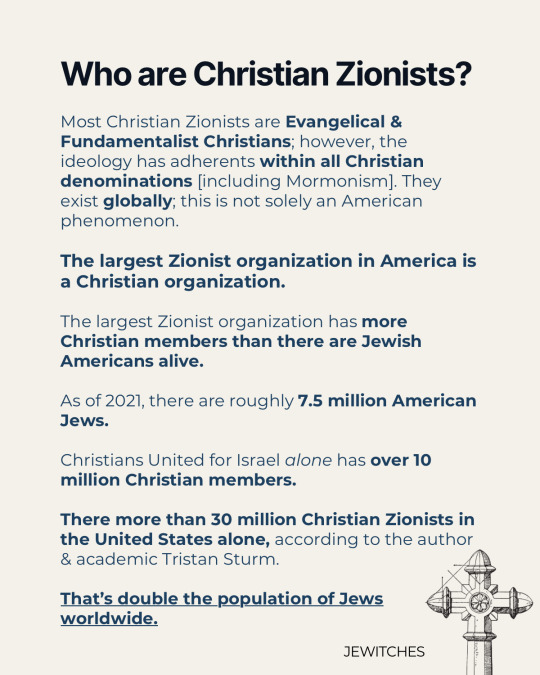




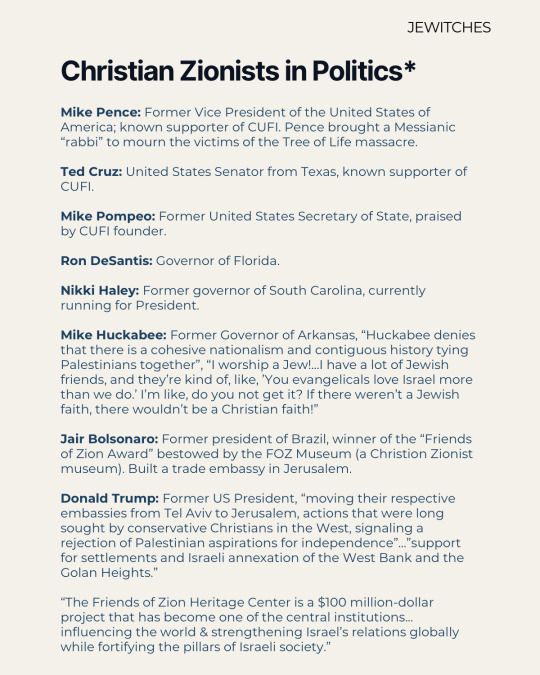
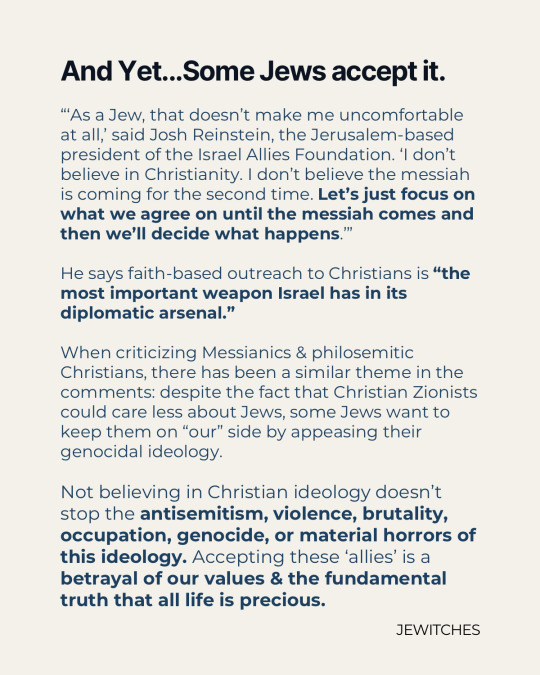
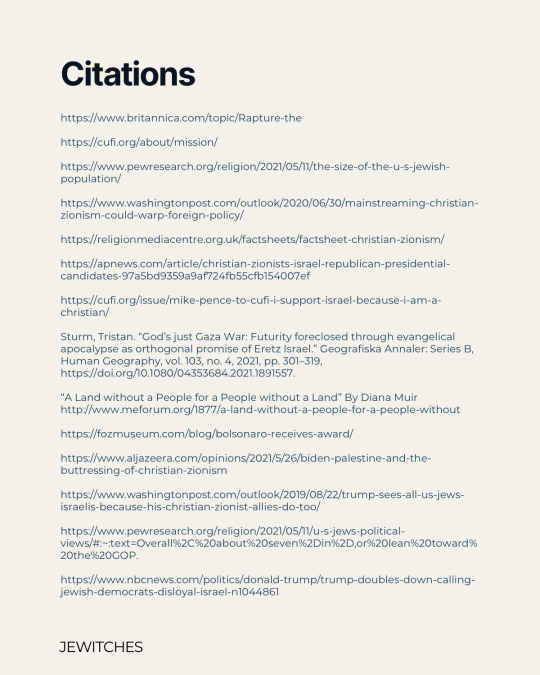
This post is meant to serve as a jumping off point. Those citations exist for a reason and we encourage you to read further. This post can only address so much.
There was so much that simply couldn’t be covered in such a short post; not to mention a breadth of research that feels like it should be must read material for this topic.
A huge thank you to willatheewisps and a.hearth.witch (on instagram) for going over this prior to posting.
Let us know in the comments if you’re interested in a post going over the origins of the Christian Zionist movement, as well as how it inspired Jewish Zionism.
Did you know that it was a “proto-Christian Zionist” Church of Scotland clergyman & author Alexander Keith who coined the phrase, “land without a people and a people without a land” in his 1843 book?
5K notes
·
View notes
Text
On the topic of appropriation of jewish political terms "Christian zionism" isn't actually zionism.
Christianity and catholicism as religions support Israel not because they support jewish self determination, but because a jewish state existing is a precursor to the Christian and catholic ends times where everyone dies and they actually end up with the land.
Of course, you can have Christians and catholic who do truly support Israel because of jewish self determination. However the "Christian zionists" antizionists tend to refer to don't.
And a big part of that does come from blatent antisemitism. Like you have plenty of jews telling people what zionism is about and people choose to ignore it or tokenize the minority of jews who agree with them.
However I do think that for a lot of people, it stems from more subtle, undescernable antisemitism. Like the type which is so deeply ingrained into people where it's something they can't even identify. The type which comes across as a vibe rather than rhetoric in people's mind.
You have different people who are telling you different things. And people might not be able to tell you why when you ask them, but they have a bias of distrust towards jews. So when this other group tells you something different to jews, there is this inherent bias to think they're telling the truth. And don't get me wrong, it's still antisemitic. Jews aren't inherently distrustful, no group is. But it exists in the same area that other bigotry of the same level exists. In the place where people are unable to go to unpack fully systemic bigotry they picked up because it's ingrained in society.
And this isn't even touching on how it's very insulting to use Christian antisemitism as an argument to say that you aren't antisemitic. The whole "I'm talking about Christian zionism not jews" antizionists use when trying to deflect from their antisemitism.
59 notes
·
View notes
Text

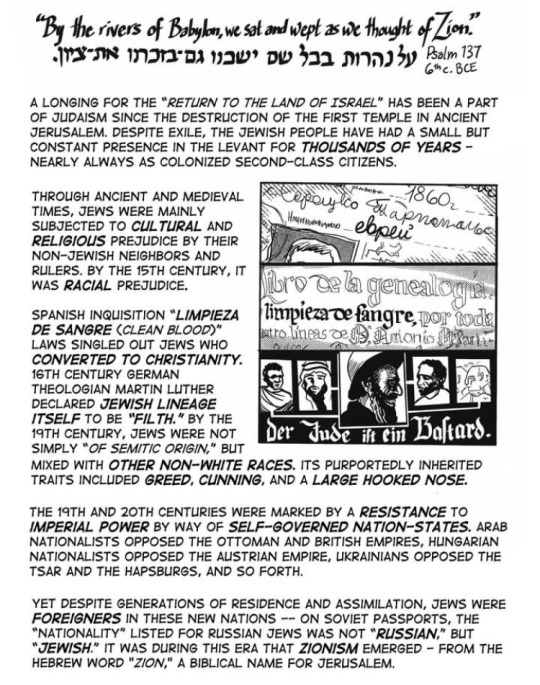

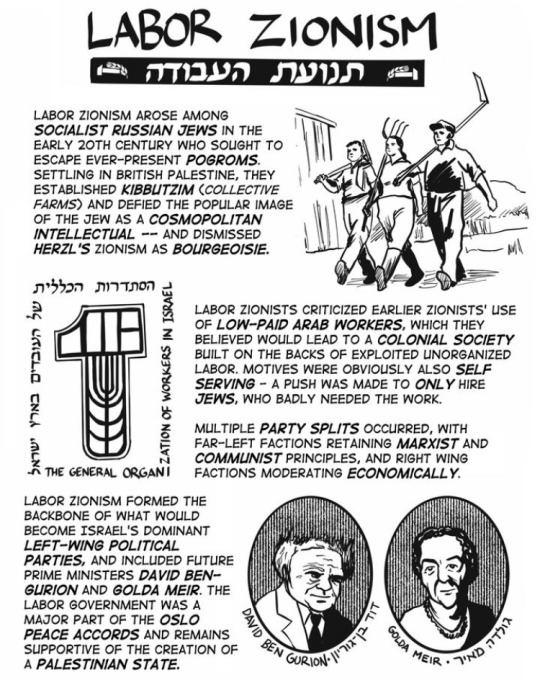


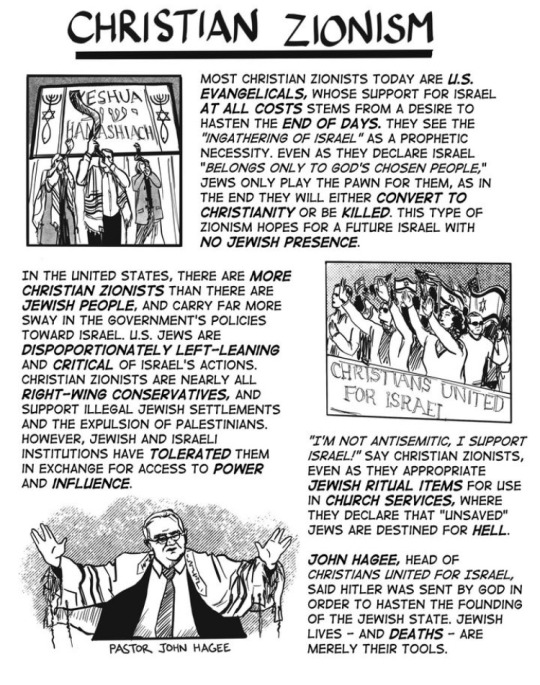
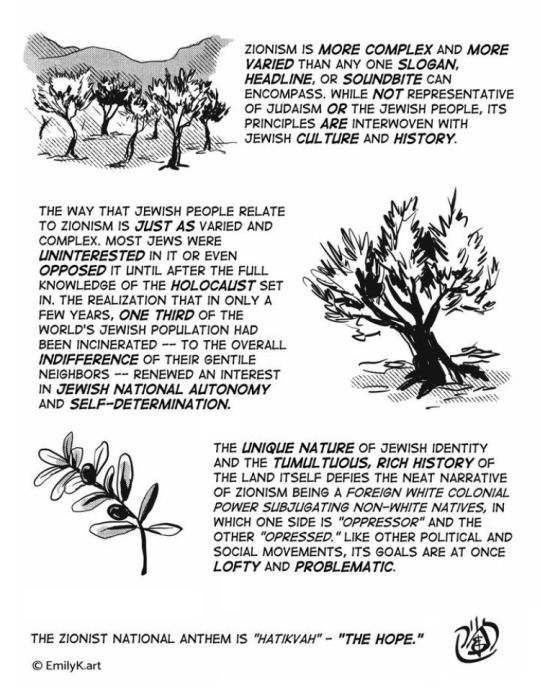
By Emily K.
Source: https://www.instagram.com/p/Cz-ja99M6UG/?igshid=ODhhZWM5NmIwOQ==
#emily if you see this and want it taken down just let me know and i will!#it said free so i figured free distribution with credit wouldn’t be a problem but if it is just message me & I’ll take it down :)#zionism#theodor herzl#jewish history#jewish culture#judaism#jewish#jumblr#israel#palestine#political zionism#labor zionism#revisionist zionism#religious zionism#christian zionism#shoah mention#israeli history#history of israel#antisemitism#jews#david ben gurion#nuance#i/p#infographic#history#explainer#the jewish state#tel aviv#hatikvah
297 notes
·
View notes
Text
A trend that I have seen lately from the antisemitic anti-Zionist crowd is to latch on to the concept of Christian Zionists. I've seen a good number of the big accounts across social media talk about Christian Zionism as if it's the same thing as Zionism as it relates to Jews.
For example; take one of the GFM "verifiers" and big anti-Zionist blogger el-shab sharing from palistani (who is a raging antisemite).

This is one example and follows the standard I've seen across ProPal social media. They will typically introduce Christian Zionism as a whataboutism to distract from the fact that their movement is full of Nazis, antisemites, and supremacists. They will not explain the differences between Christian Restorationism Zionism and Zionism, nor explain how it came about, and then drop the "Christian" modifier and just call refer to it as Zionism from then on. This is part of how they are and have been spreading the "Zionism is a White Supremacist Colonizer ideology".
Most people don't know the difference between Christian Zionism and Zionism. Most people don't know that Christian Zionism is Christian Restorationism and that they changed the name of their belief/ideology to "ally" with Jews and garner support. But that "allyship" with Jews is conditioned on the fact that they need us to be in our homeland so that they can get their Second Coming Apocalypse ending.
That's it.
That's the whole thing.
We need to be in Israel so the End Times can happen and that's why they're (Christian) Zionists.
It has nothing to do with Zionism as it relate to Jews, Jewish safety, Jewish identity, Jewish indigeneity, and so on.
It's just another appropriation by goyim.
Now, End Times style Christians in the USA tend to be right wing bigots. They're typically the ones ranting about how *insert hated group* are a sign of the End. They push for legislature that is discriminatory and hateful. Many of them are White Supremacists and proud of it. This is a common tactic used by the mouth pieces of the anti-Israel movement; distract and redirect.
Do they have Nazis in their movement? Yes. But don't focus on that. Focus on this other thing that I'm holding in front of your face that is totally the worse thing so that you don't question why we have Nazis, antisemites, and other bigots in our group.
Jews are not Christian Zionists and cannot be. Zionism as it relates to Jews is completely separate with its own subtypes couched underneath it. But to conflate their Christian beliefs with a Jewish ideology is a fallacious argument that really shows how desperate antisemites anti-Zionists are.
After all these months it appears that people are listening to Jews about what Zionism actually is vs what these protesters have been telling them it is. They need to go "well what about this Zionism?! huh? huh?" as if it's another gotcha. But just like they've been defining Zionism as if it was Kahanism, this new talking point will just be another nail in the coffin of "it's anti-Zionism, not antisemitism!"
#jumblr#antisemitism#leftist antisemitism#Christian Zionism#Zionism#Christian Zionism is not the same as Zionism#It's anti-Zionism not antisemitism I swear#Goyim stop appropriating Jewish culture and ideology challenge
84 notes
·
View notes
Text
i've said it before but it's still wild how few people seem to know about christian zionism. a not-insignificant part of american evangelicals (who make up a decent chunk of the republican party) genuinely believe that the modern country of israel needs to continue to exist and hold power (and is allowed to do as many war crimes as it wants to in the meantime) because we need it here in order to fulfill an APOCALYPSE PROPHECY and usher in the rapture so we can all meet jesus :). the united states' foreign policy is being partially influenced by a literal death cult and hardly anyone talks about how fucked up and frankly bizarre it is. like.
26 notes
·
View notes
Note
I've been reading up on some of the resources you've provided regarding christian zionism for a while now but apologies that I'm still a little confused here and there.
i have a question, i was wondering what we can say to counter the ,chosen people and promised land, argument because a lot of what counter argument that would be given back is that the bible is absolute, God's word and should not be contended. how do we counter these absolutionist to show that what is happening is wrong but at the same time that we do still respect, love and believe in God?
at some point i do wonder if it is worth fighting it to those who are obviously unwilling to change their stance? and if the energy is better spent elsewhere instead?
To start with your last question, yes, I do think there comes a point when you realize you cannot change someone's mind, and you are wasting time and energy you could better spend elsewhere. (And if this is the kind of person who responds to any argument you could possibly make with "Well this is just what the Bible says," that's always a good clue they probably aren't very open to change.)
My tactic when this happens is to say something like "It's clear you aren't willing to hear another perspective right now, so I am going to end this conversation. But if something happens down the line that makes you more willing to consider my side, hit me up." That way they have somewhere to go if by some miracle they one day want to learn more, but I won't use up all my energy on them now when it's clearly useless.
You may come up with a different tactic, but whatever you want it to be, it's def good to consider it before a situation arises!
That being said, for other folks it is possible to get through!
I answered an ask over on my other blog with suggestions for talking to a friend who takes that "the Bible says Israel is a blessed nation" stance. One thing I suggested was choosing language that frames things as a conversation, not an argument; here's a bit from that pasted here:
For instance, in the scenario where she said “the Bible says we should always stand with Israel,” responding immediately with “no it doesn’t!!” would shut down conversation.
Instead, you might start with open-ended questions the two of you can explore together: “I wonder what the Bible means when it talks about Israel. Would the biblical authors recognize today’s Israel as being the Israel they were talking about? / Is the Israel of today the same as the Israel of the Bible?” “What does it mean to you to ‘stand with Israel’?” “Does that have to require sending them extreme military weapons?”
If they're open to pondering those questions informally together, at some point you might be able to share some further information. I highly recommend Christian Palestinian theologian Mitri Raheb's book Decolonizing Palestine, which includes (mostly in its second half) an interrogation of how people interpret the concept of biblical election or chosenness.
I have a detailed summary of his book at this link; I'll paste the pertinent parts below:
First off, in the book's intro, Raheb notes how conflating Israel the modern state and the "biblical" Israel has been an intentional part of Israeli propoganda since its founding (he explores this further in his history chapters):
“The settler colonial nature of the State of Israel is obvious, and the reality on the ground is crystal clear. The situation is not ‘complicated’ as some claim in order to blur the issue. International law is decisive on this issue, as the many UN resolutions testify. Yet, biblical passages and terms such as ‘divine rights,’ ‘land promise,’ ‘Judea,’ and ‘chosen people’ are constantly repeated to bestow the colonization of Palestine with biblical legitimacy and thus political legality. This terminology is used in church circles, popular events, as well at the highest political levels like the UN Security Council.”
His third chapter hones in on the theme of land — its centrality in scripture, and its centrality in the modern occupation of Palestine. How is this theological theme exploited as ideology? What are some decolonial Palestinian readings? Ultimately, how do we liberate theological minds from their invisible colonization?
Toward a Decolonial Theology of the Land
We need our theology to pay more attention to the geopolitical situation of Palestine, which includes the two hermeneutical keys of the land and the native people
Palestine has always been a land on the margins of three continents and “five regional powers that have determined its fate”; constantly getting pushed and pulled by these greater powers, constantly forced to adjust identity and boundaries within a changing context: “Adjustment, resistance, and liberation from occupation is a connecting thread of Palestine’s history from the second millennium BC until today”
Palestinian Jews have always been part of the native “people of the land” — but settler colonial Zionists are not part of the people of the land; “They are invaders and subcontractors to empires.”
Palestinians today who don’t fit a European framework are silenced, not considered dialogue partners — this includes Muslim Palestinians and Palestinian Christians, along with native, anti-Zionist Jews and Samaritans. But their experiences — “their suffering under occupation, their aspiration for liberation, their struggles and hopes” — are the kinds of voices that the Bible holds: “the Bible is the book that contains these voices, the voices of the colonized, not the colonizers.”
Finally, we get to chapter 4: Chosen People?, which hones in on biblical election and how it “constitutes a theological dilemma for the Palestinian people.” Ultimately he concludes,
“While the original context of chosenness was a feeling of powerlessness in the face of empire, chosenness today must be sited within the context of European nationalism, settler colonialism, and American exceptionalism.”
Raheb reminds us about the four distinct Israels:
The relatively short-lived Northern Kingdom of Israel
Biblical Israel as abstract theological concept describing “God’s people”
“Ancient Israel” as a modern construct “that confuses certain aspects of the biblical story with history, thereby projecting an exclusive ethno-national and religions state into the Bible”
Modern entity called the State of Israel
All these must be distinguished from each other, from Judaism, and people of Jewish faith
General issues with “election”
“Who is elected: individuals, a group of people, a nation? “Israel”? How do we define “Israel”? A race? A religion? A state? The church?”
And what does election mean for the un-elect? - 17th century Jewish philosopher Baruch Spinoza wondered if it even makes sense for God to divinely elect a particular group of people: “Can we, who live in a post-Enlightenment era of human rights and fundamental equality between people, believe in a God who discriminates between people, with some being elected, and others not elected or even some elected to be damned”? .
Palestinians are equated with un-elect biblical peoples — either: - The Philistines, enemies of “Israel” - The cursed Canaanites - Descendants of Ishmael (along with all Arabs), giving them a “lesser theological status” than the descendants of Isaac, i.e. the Israelies
“While some Christians may sympathize with the humanitarian situation of Palestinians, their emotional and theological bond remains with Israel because they are seen as God’s elected people with a unique entitlement.”
Here’s Raheb’s own decolonial perspective on election:
The Bible must be read as story, not history.
“God’s own story cannot be confined to such a short period of the universe’s history or reduced to one region, or, as a matter of fact, to one planet. God’s story is not the exclusive story of people with God.”
The Bible is the story of people with God — particular people with particular cultural and geographic backgrounds
Jews, Christians, and Muslims continue to relate to this particular story, but it’s not self explanatory; it needs to be retold and reinterpreted
We can respect different groups’ experiences of being “chosen” without making these beliefs ideology or treating them as objective facts
The biblical story is particular, but it “made history because of its relevance to the diverse contexts of imperial hegemonic oppression worldwide” — the Bible helps many find meaning in the face of empire - “This is why election can never mean entitlement to a particular land or people” — within scripture, we see that God’s interest is not only with one people.
“[E]lection is God’s business, and no one has a monopoly over it. God’s salvation surpasses all understanding, and God remains the God of surprises that all our theological systems cannot contain.”
Bringing in the geopolitics of the biblical story
“The region of Palestine was too small and lacked the geographical location and resources to develop into an empire;” instead its fate was dictated by the five empires that surrounded it
This peripheral existence is the “background behind the notion of election” — it’s a promise to the disenfranchised and the desperate, those crushed by Empire.
“Election was and will always be a statement of faith; it is solely a promise…to those weak and powerless.”
Later — when the northern region became Samaria and the southern region became Judaea — this notion of election would be weaponized to give one group religious entitlement over the other. .
We must “always keep in mind these two different and opposed religious utilizations of the notion of election: one as a message of hope for the weak and devastated, and one as a tool for religious and national ideology.”
21 notes
·
View notes
Text








An astonishing number of elected officials hold these deeply racist and unhinged beliefs. Food for thought.
Repost from @theslowfactory:
•
And it’s not just the U.S.– Christian Zionism has strong roots in countries like South Korea, Nicaragua, and Brazil, positively promoting and shaping political diplomacy with the apartheid state of Israel.
The more you know 🌈
Everything is political. Link in Bio to join the movement for change
Sources:
https://www.pewresearch.org/religion/2015/05/12/americas-changing-religious-landscape/
https://merip.org/2019/08/countering-christian-zionism-in-the-age-of-trump/
https://www.washingtonpost.com/news/politics/wp/2018/05/14/half-of-evangelicals-support-israel-because-they-believe-it-is-important-for-fulfilling-end-times-prophecy/
https://www.timesofisrael.com/despite-pms-assurances-christian-zionists-bedeviled-by-anti-missionary-bill/
https://www.npr.org/transcripts/1197956512?ft=nprml&f=1197956512
#palestine#human rights#free palestine#gaza#israel#free gaza#gaza genocide#zionism#jewish antizionism#antizionist#anti colonialism#colonialism#decolonization#decolonise palestine#jews against israel#jews against genocide#antizionist jews#imperialism#Christian Zionism#republicans#right wing#evangelicals
19 notes
·
View notes
Text
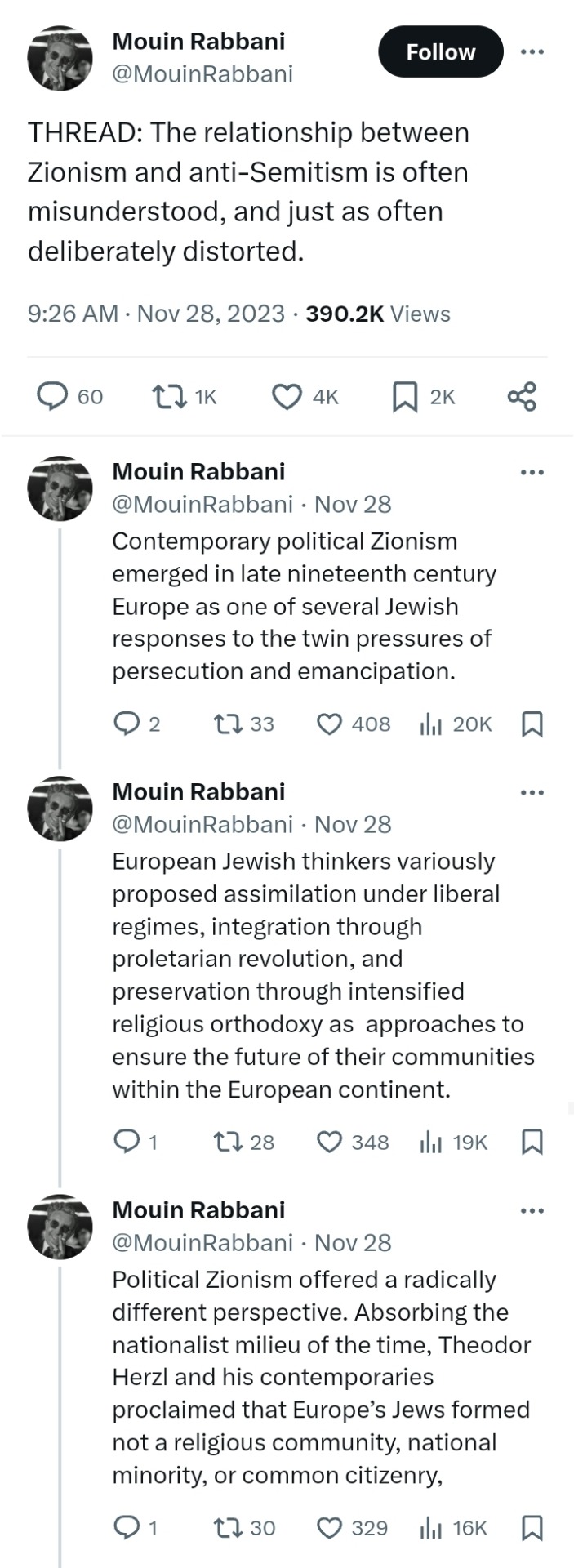
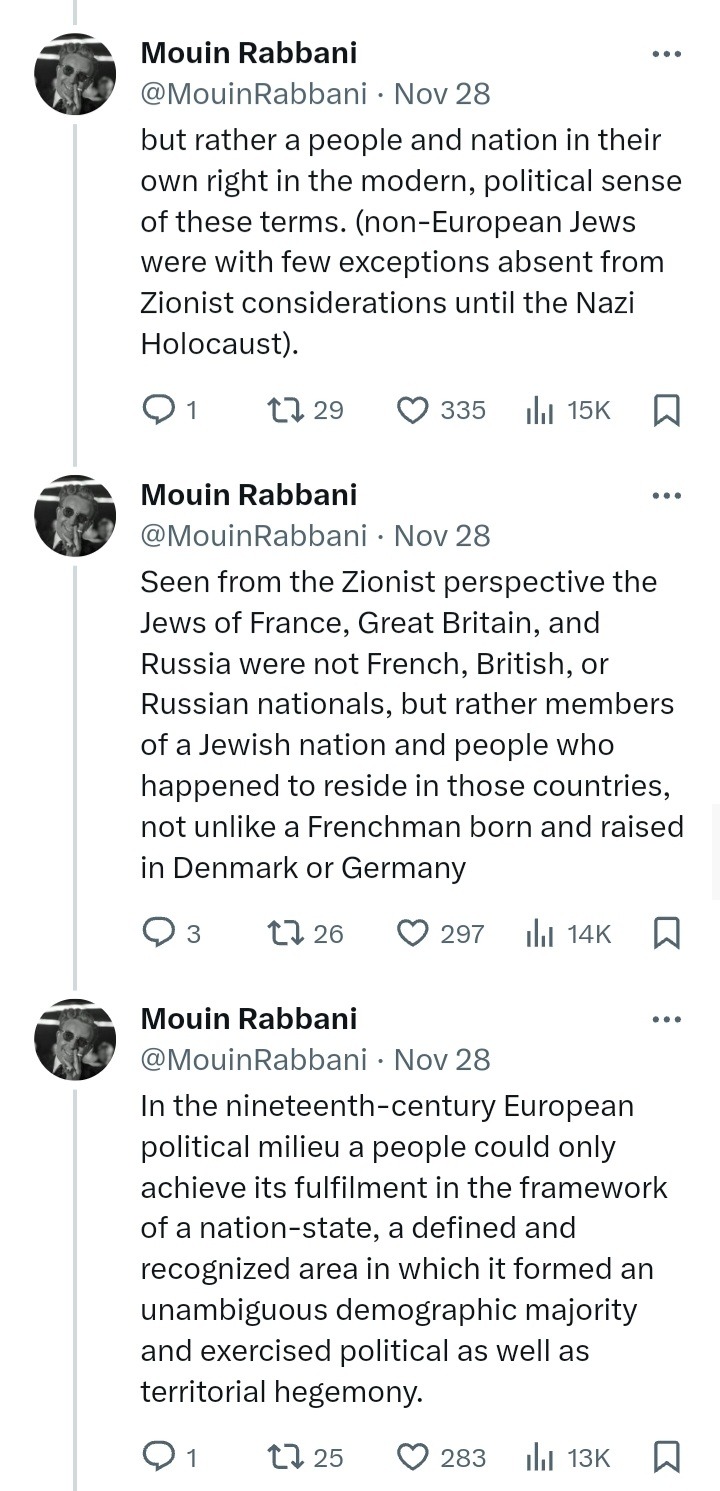
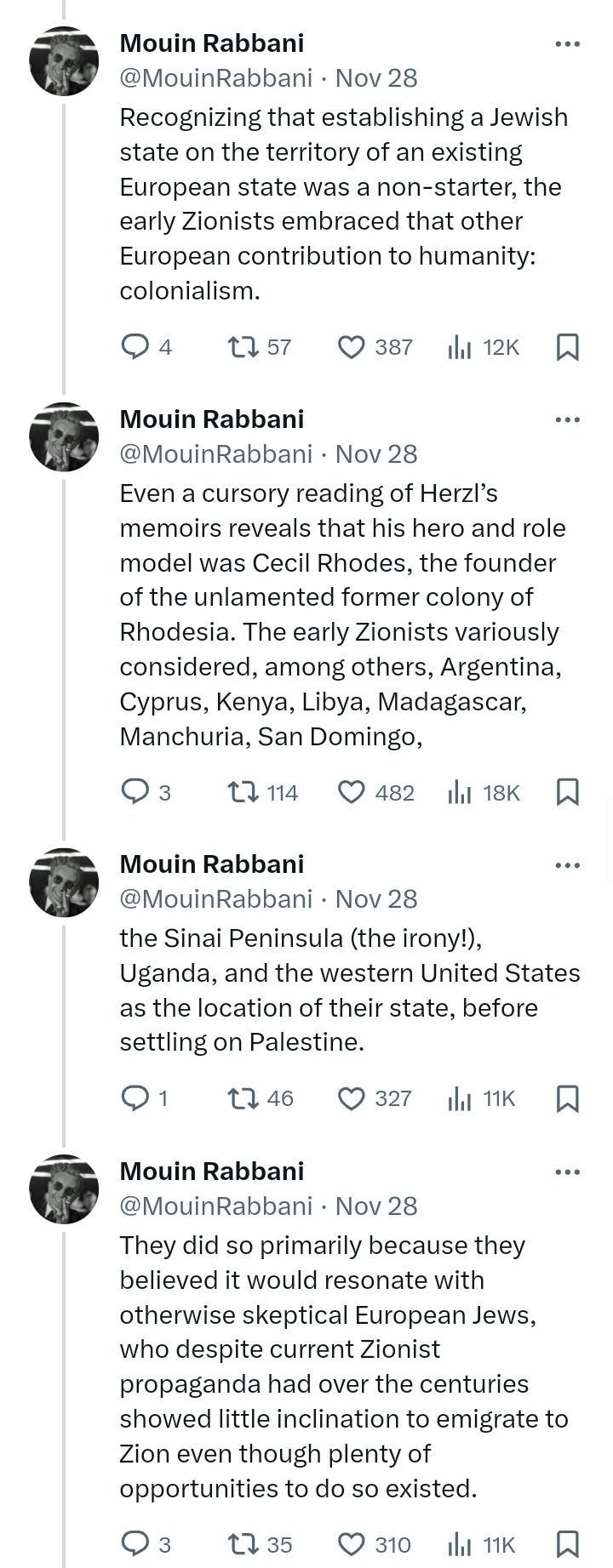
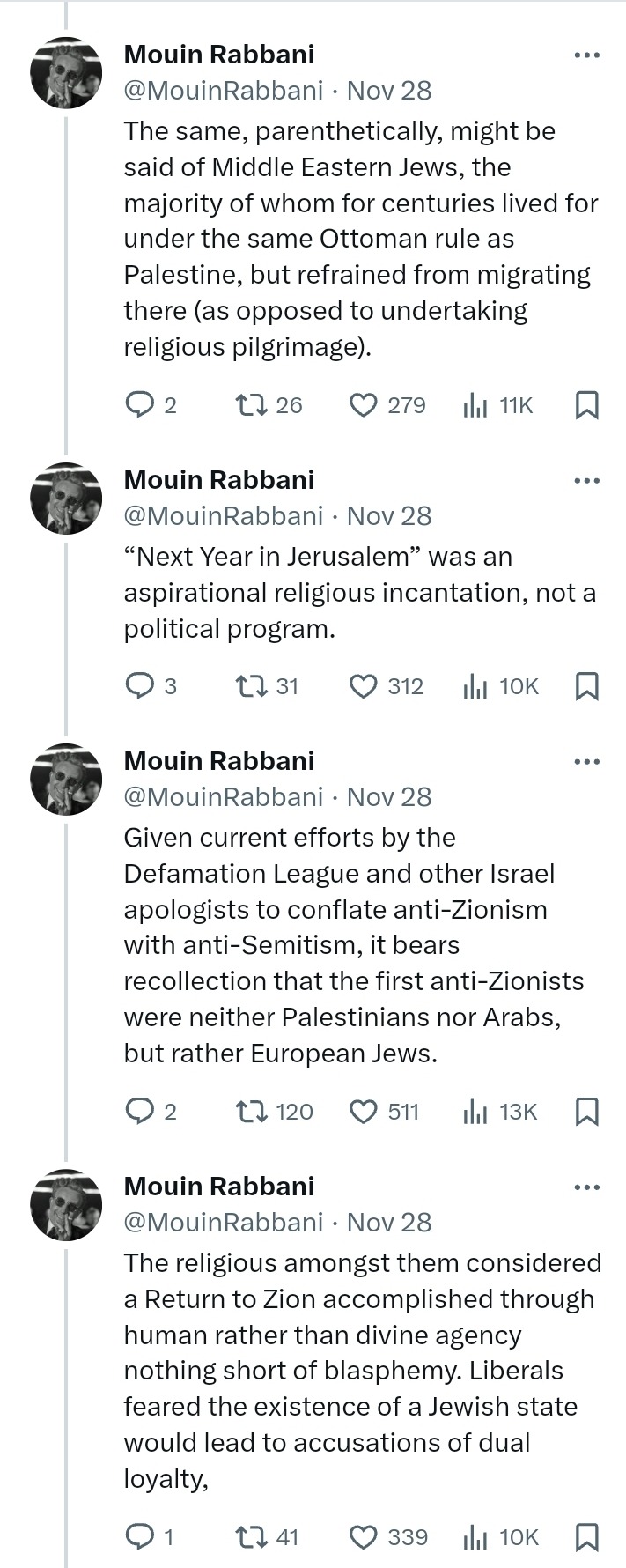
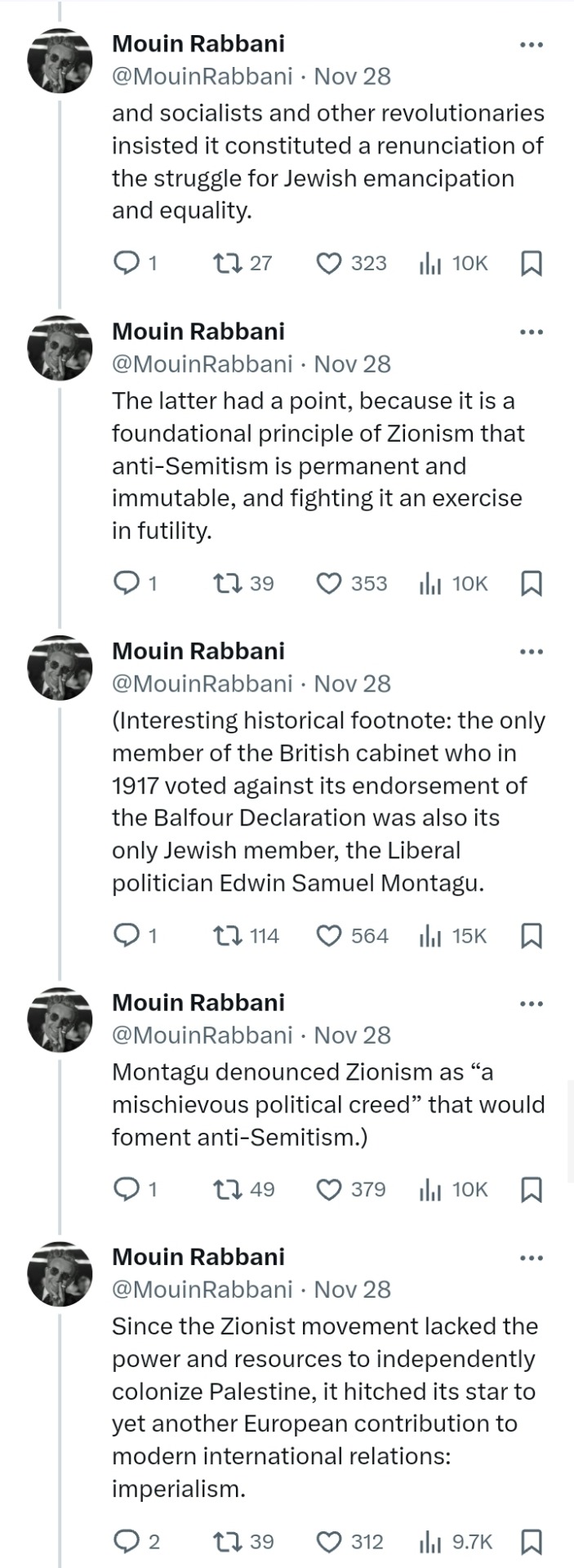
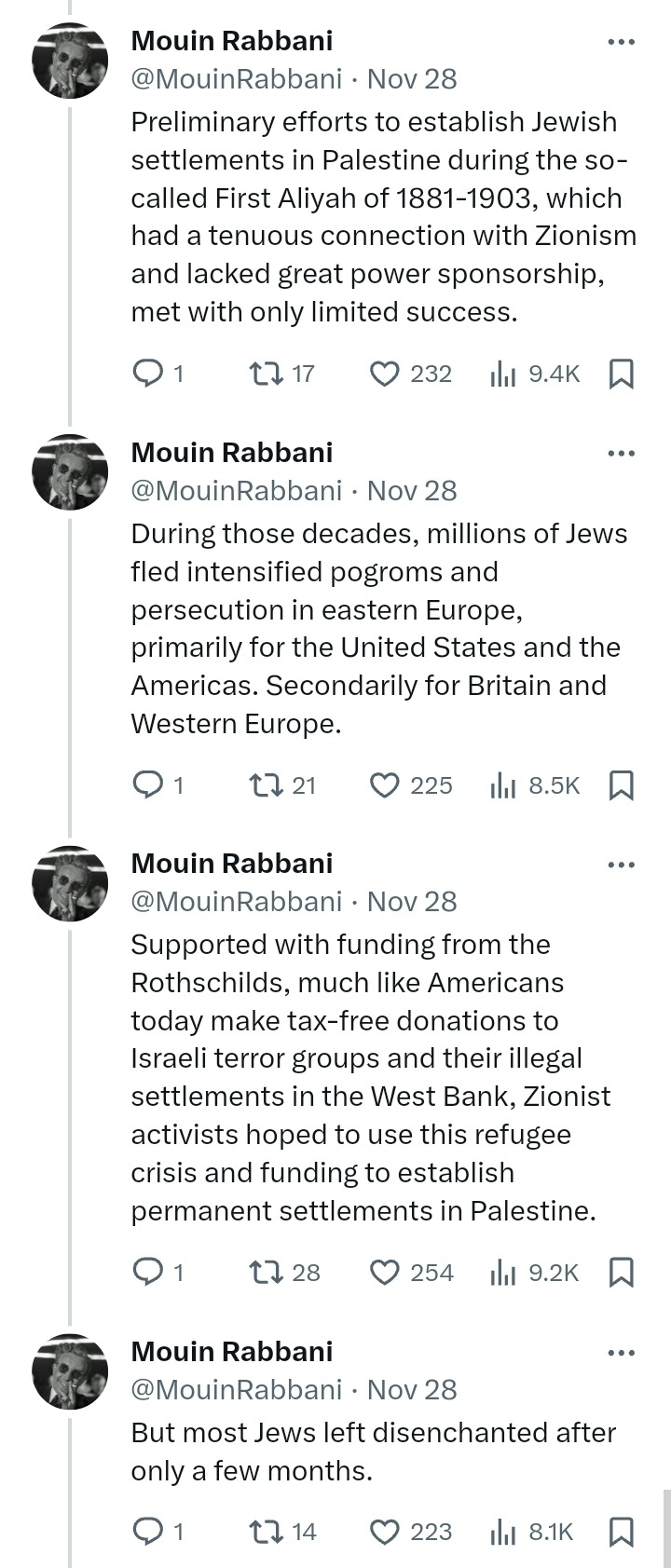
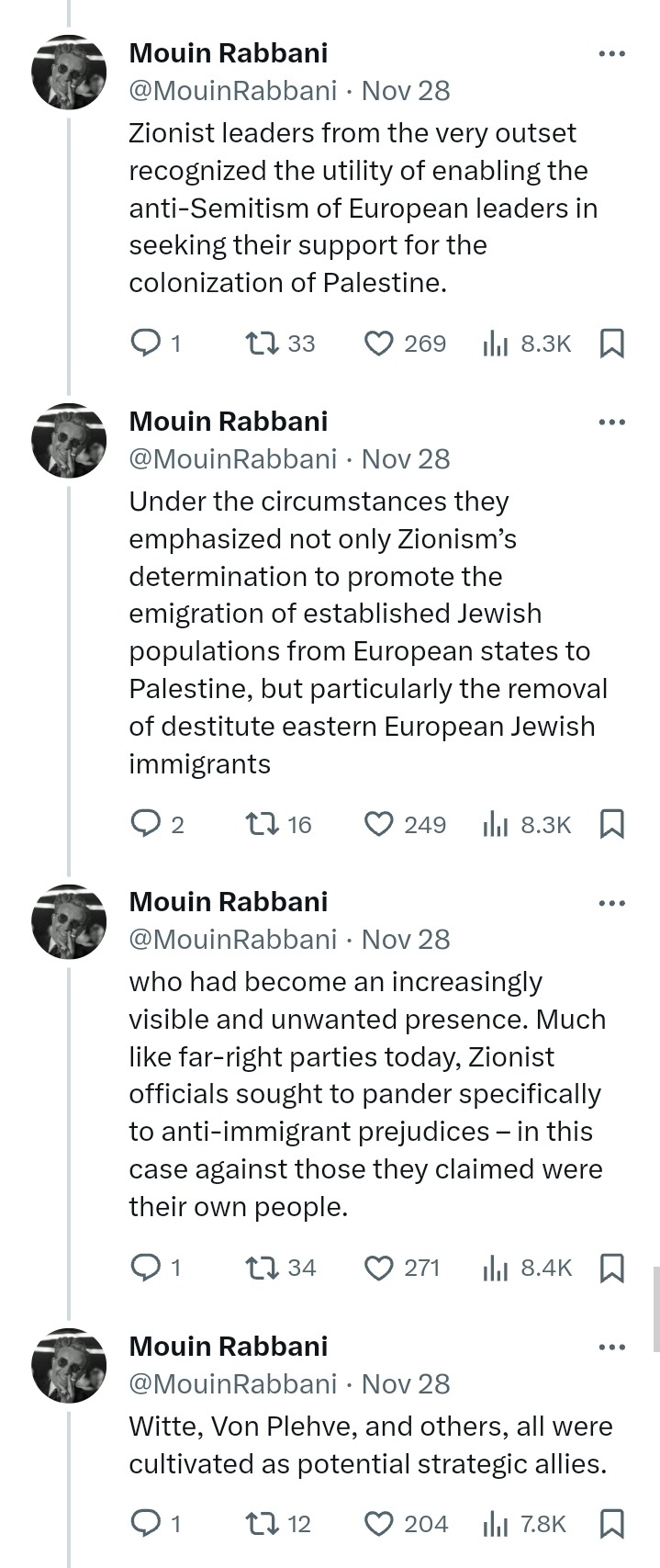
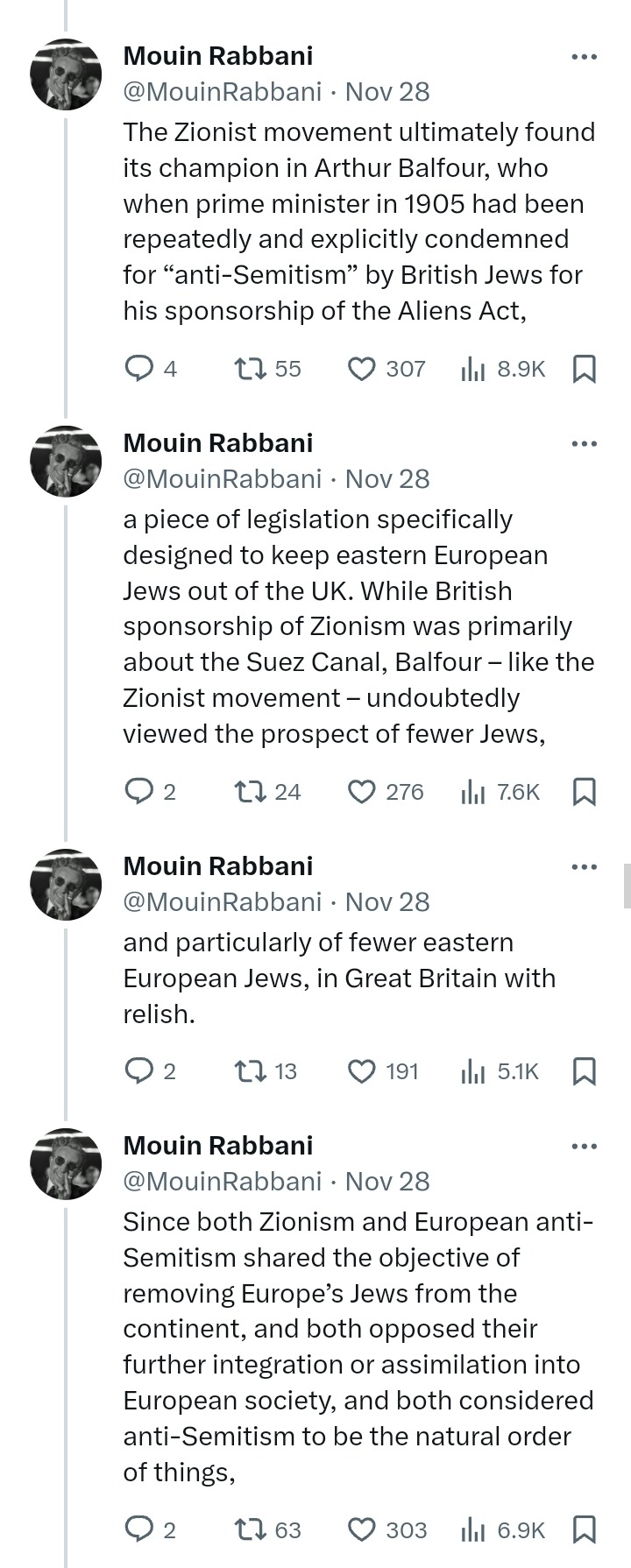
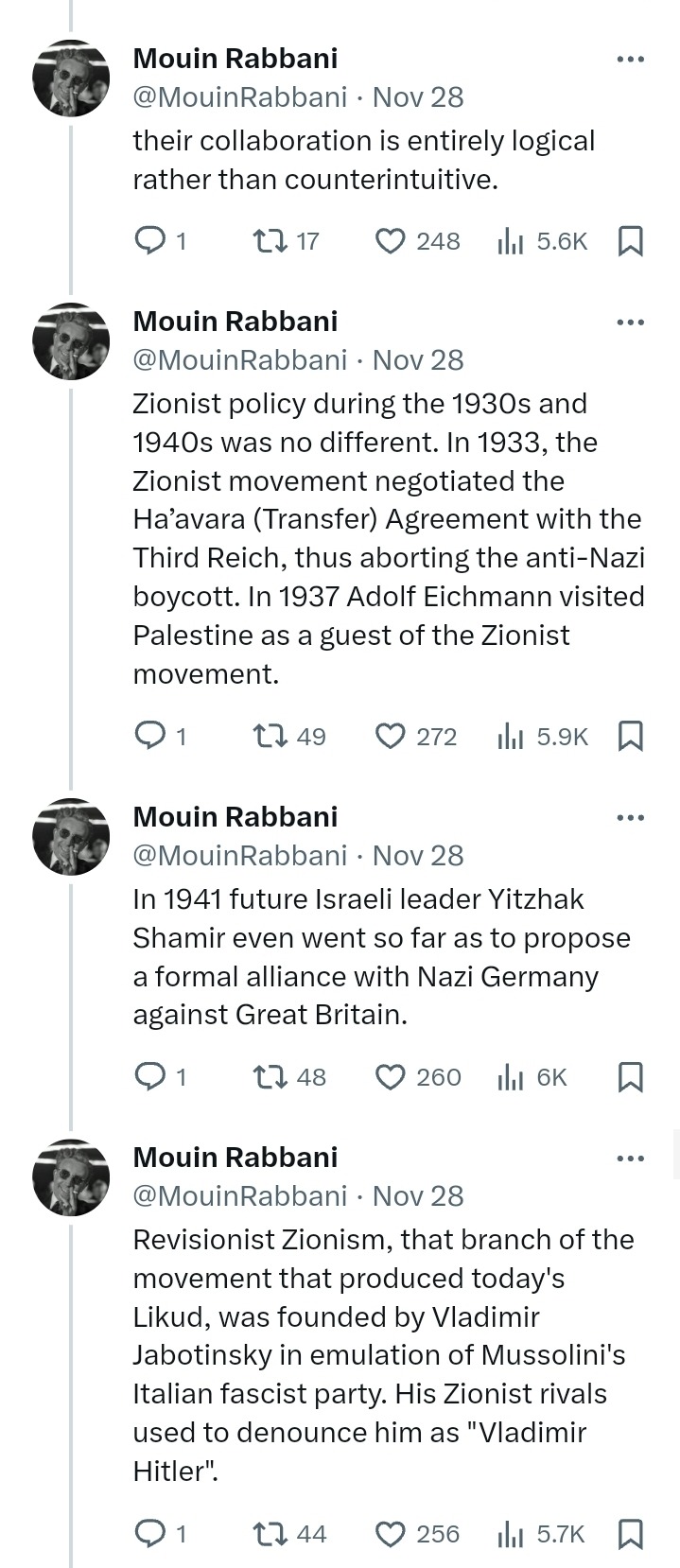
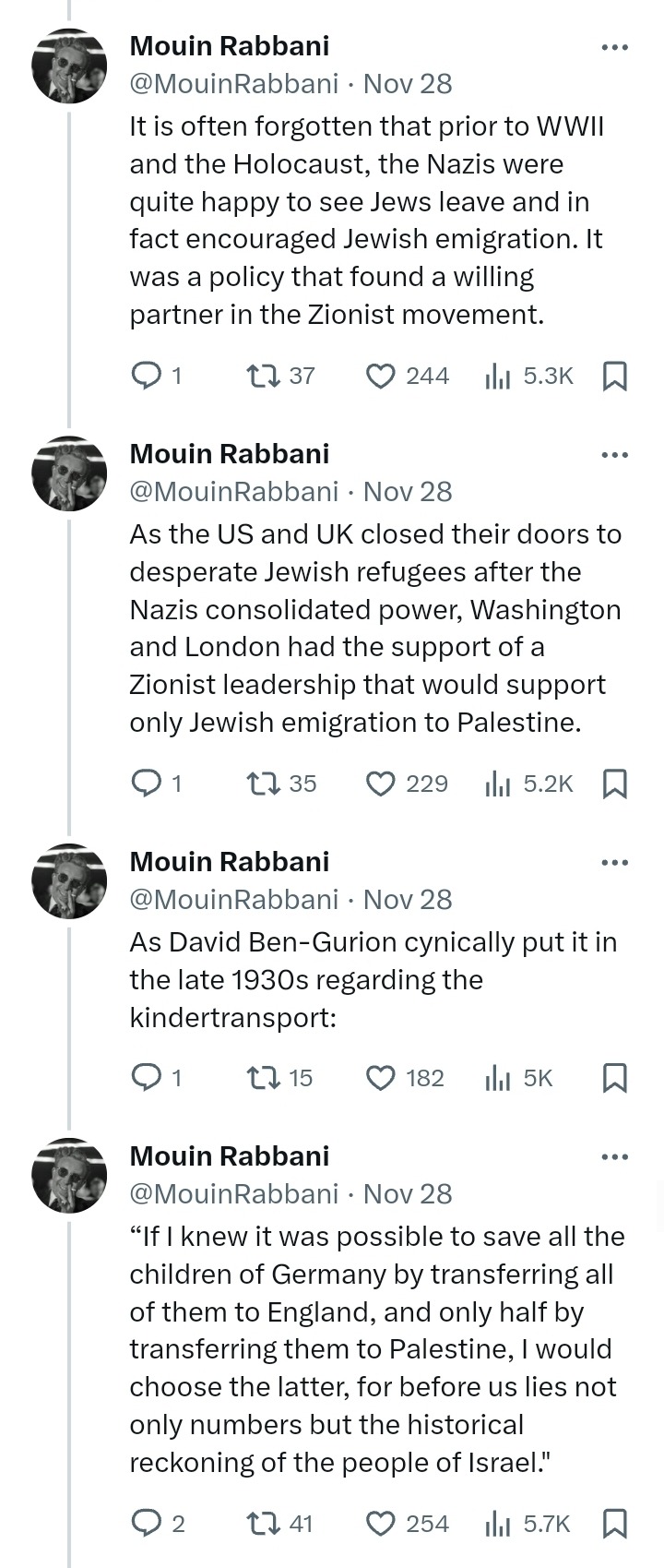
(cont'd in reblog.)
#free palestine#anti zionisim#anti zionist#colonization#imperialism#apartheid#antisemitism#world history#western imperialism#theodor herzl#colonialism#balfour declaration#cecil rhodes#racism#anti blackness#zionist propaganda#settler colonialism#palestinian genocide#christian zionism#xenophobia#immigration#middle east#islamphobia#david ben gurion#holocaust#nazi germany#MENA#knee of huss#xtianty
68 notes
·
View notes
Text

#zionism#israel#am yisrael chai#jumblr#jewblr#christian zionism#jewish zionism#gaza#gaza genocide#antisemitism#palestine#genocide joe#free palestine
25 notes
·
View notes
Text
I don’t think you can fully confront the US’ support for these ongoing atrocities without understanding and confronting Christian Zionism. Christian Zionism often objectifies Jews while also dehumanizing Palestinians.
If you want an introduction to the Palestinian Christian perspective on this harmful ideology, I highly recommend the book The Other Side of the Wall by Reverend Munther Isaac and also checking out the event Christ At The Checkpoint." from Hannah Smith, 19/Apr/2024:
#Christian zionism#zionism is white supremacy#zionism is facism#anti zionist#anti zionism#fuck zionism#palestine#free palestine#gaza#free gaza#from the river to the sea palestine will be free#i stand with palestine#rafah#save rafah
24 notes
·
View notes
Text
The Green family are notoriously against every one of our values and they put their money where their mouth is. CUFI is not the only massive corporation that is funding Christian zionism in the USA. Corporations like Hobby Lobby, which have philanthropic arms and are subsequently funding the ‘charities’ of those who reap the profits of the corporations are extremely present in our landscape.
For those of you who follow our Threads, you’ve already seen today’s discussion…But for many of you, this is brand new.
Have questions? Ask away. Make sure to watch our other videos or read the blog! We’ve linked it in our link tree for easy reading!
90 notes
·
View notes
Text
im no tankie but even i can see how fascists like tributary from liberal clinton-biden jumblr are going mask off as the trump-putin fascs they and clinton-biden all truly are… like is this satire or holy shit

please tell me how you REALLY feel 😭 mask off mask off
20 notes
·
View notes
Text
9 notes
·
View notes
Text
These two articles should hopefully explain why I don’t see not voting as harm mitigation for the Palestinian genocide. As awful as it’s been under Biden, under Donald it could be so much worse.
I’m not going to judge anyone for abstaining, because I totally get why you’d be disgusted with our government. However, I also think it’s important to be able to make informed decisions. Even if the information doesn’t change anyone’s minds, I hope it can help the people who disagree with each other regarding voting understand each other’s perspectives better instead of devolving into shouting matches accusing each other of not caring about what happens to the people of Palestine.
#palestine#u.s. politics#genocide tw#islamophobia tw#antisemitism tw#christian zionism#christian dominionism
5 notes
·
View notes
Text
Kate Briquelet at The Daily Beast:
MAGA pastor Sean Feucht and a band of Christian nationalists are glomming on to campus protests against Israel’s war on Gaza, leading “United for Israel” marches at Columbia and the University of Southern California while professing their belief that the conflict is a harbinger of the “End Times” predicted in the Bible. On Wednesday night, Feucht’s followers and far-right extremists rallied outside USC with the help of a police escort—an image that stands in stark contrast to the LAPD officers in riot gear who previously arrested activists from the school’s pro-Palestinian camp. The Christian Zionist parade kicked off with Feucht performing contemporary worship music (“Our God is an awesome God”) and anti-LGBTQ speakers like preachers Lou Engle and Ché Ahn, who once crowed at a “Stop the Steal” rally: “We’re gonna rule and reign through President Trump and under the lordship of Jesus Christ.”
Feucht, looking every bit the part of a Jesus rocker in a black jean jacket, fired up the crowd with a concert before the march. “Lord, we stand together against hatred, bigotry, anti-semitism, violence that’s taken over this campus and the streets of the city,” Feucht said between songs. “God, I just pray today that America would see a different story tonight.” “Where they’ve seen division, they would see unity and joy,” added the 40-year-old Sammy Hagar-coiffed pastor, who once prayed over former President Trump and Florida Gov. Ron DeSantis and his wife Casey. Afterward, Fox News portrayed Feucht as a hero of sorts for the Jewish people. “We want Americans to see that we are fed up with this rot of anti-Semitism on the college campuses, and that we’re gathering together in unity, bringing prayer, bringing hope,” said Feucht, who’s risen to MAGA fame and riches after holding worship concerts flouting COVID rules in 2020.
The irony of divisive activists making up the “unity” flock didn’t seem to be lost on reporters and extremism researchers, including Kate Burns, Jeremy Lindenfeld, and Kelly Stuart, who documented the scene in real time. They estimated a few hundred participants showed up versus Feucht’s projection of “thousands.”
[...]
“There’s a veneer of interfaith, there’s a veneer of solidarity,” said Taylor, a senior scholar at the Institute for Islamic, Christian, and Jewish Studies (ICJS). “I do interfaith dialogue for a living. These people are not doing interfaith dialogue. They’re doing Christian supremacy, but they’re cloaking it in the garb of interfaith solidarity.”
“If Sean Feucht is an enemy of anti-Semitism, why does he hang out with Proud Boys and QAnon supporters and conspiracy theorists at places that tolerate outright anti-Semitism like the ReAwaken America tour?” Taylor added. “Why does he invite far-right militia members to be security at his own events? Color me skeptical that Sean Feucht cares one whit about anti-Semitism.” (A Proud Boy and a Jan. 6 insurrectionist reportedly belonged to Feucht’s security team at his Oregon “Let Us Worship” event in 2021.) Feucht has also palled around with podcaster Elijah Schaffer, who has made anti-Semitic remarks along with his guest speakers like white supremacist Nick Fuentes. “Do you believe Jews disproportionately control the world institutions, banks, & are waging war on white, western society?” Schaffer asked in a 2023 Twitter poll.
[...] In New York, Feucht teamed up with conservative radio host Eric Metaxas, who, according to Media Matters, uses his platform to promote the belief that Christians should control the government, and once punched an anti-Trump protester in the face. A day before descending on the Big Apple, Feucht went live on Facebook and appeared almost giddy about the “end days.” “Yes, these are the end days,” Feucht said. “I know people say all the time, ‘Everyone’s saying it’s the end days.’ ‘Jesus said it was the end days 2000 years ago.’ Well, it is the end days, and we’re one day closer to the return of Jesus.” “And as that ramps up, we’re going to see a rise of evil, we’re going to see a rise of glory, and we’re gonna see a rise of hatred for the Jewish people.”
[...] Many evangelicals like Feucht believe in an End Times prophecy where Jews will return to Israel (and convert to Christianity) as part of Jesus’s Second Coming.
Far-right Christian nationalists such as Sean Feucht have traveled to various campuses where protests against the Gaza Genocide are happening to preach a right-wing pro-Israel Apartheid rally under the guise of an “interfaith rally.”
#Sean Feucht#Christian Nationalism#Let Us Worship#Campus Protests#Israel/Hamas War#Israel Apartheid#Gaza Genocide#Ché Ahn#Lou Engle#Christian Zionism#Elijah Schaffer#ReAwaken America Tour#End Times#New Apostolic Reformation#Religious Right
11 notes
·
View notes
Text
I'm sure the christian zionists are acting very reasonable and empathetic about all this and in no way are making it about themselves
#not sure i want to check on the fundies but i need to know what my enemies are up to#been a long shitty week of me not losing my cool at work#and not sleeping so thats great#for a multitude of reasons not just palestine#so i dont think i need to bait myself with looking at what jill fucking rodriguez thinks#havent even caught up on the news today just got home#christian fundamentalism#christian zionism#palestine
19 notes
·
View notes